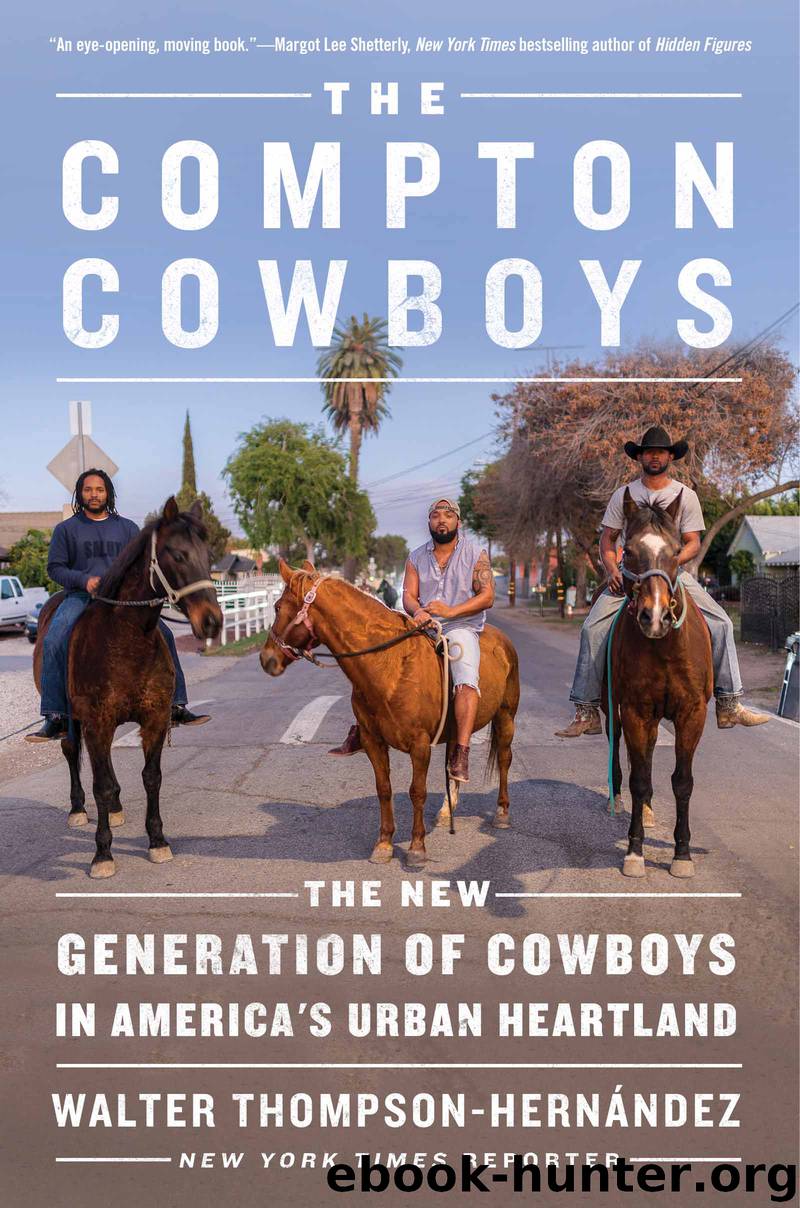The Compton Cowboys by Walter Thompson-Hernandez

Author:Walter Thompson-Hernandez
Language: eng
Format: epub
Publisher: HarperCollins
Published: 2020-03-05T16:00:00+00:00
Both Randy and Keenan had grown up listening to rap groups like N.W.A but had never had someone speak to them the way Kendrick’s music did. His music provided a soundtrack for their lives in ways that no other musician had done before. Kendrick understood what it was like growing up in the ’hood, and many of the traumas and everyday struggles he experienced were Randy’s and Keenan’s too. Also, like Kendrick, they had grown up eating at Louis Burgers on Rosecrans, and both navigated through the same situations with girls that Kendrick often rapped about. They both also considered themselves good kids in a mad city.
Kendrick’s music spoke to them in a way that the older generation of Compton rappers like Eazy-E and Dr. Dre could not. They were all dodging the same bullshit that came from growing up in the ’hood, and they were the same age and from the same generation. Kendrick inspired Randy to consider what kind of influence the ranch could have outside of Compton. He hoped to create bridges between other black cowboys around the United States by adopting similar youth ranch programs in other urban cities. It could be the start of a movement. If horses could work in Compton, they might work in other neglected urban communities as well. There were black cowboys in Philly, black cowboys in Chicago, and new groups popping up in just about every American city. It was making such an impact here, he thought, why not spread it elsewhere? It could be the prototype for all other ’hoods in America.
The dream of uniting the Compton Cowboys with other black riding communities was both palpable and a challenge. Social media had allowed the cowboys to connect with other riders, and as each day passed, more and more black cowboys from around the country began to contact him about the need to create more programs for black youth riders. The incentive to create more riding programs felt especially urgent as the killings of unarmed black men by police officers continued to occur throughout the United States. Randy believed that the ranch could serve as a model to help decrease the violence. Black Lives Matter was about camaraderie and caring for other black people. It was the social justice movement in this political moment, and these horses, Randy felt, could help save black lives too.
Download
This site does not store any files on its server. We only index and link to content provided by other sites. Please contact the content providers to delete copyright contents if any and email us, we'll remove relevant links or contents immediately.
| Riding | Showing & Training |
Finding Gobi by Dion Leonard(2253)
Grumpy Cat by Grumpy Cat(2115)
The Silkworm by Robert Galbraith(1995)
A New Earth: Awakening to Your Life's Purpose by Eckhart Tolle(1969)
End of Days by Sylvia Browne(1819)
Tippi by Tippi Hedren(1761)
Total Cat Mojo by Jackson Galaxy(1687)
Backyard Chickens Beyond the Basics by Pam Freeman(1613)
The Animals Among Us by John Bradshaw(1506)
The Ultimate Pet Health Guide by Gary Richter(1428)
Vet in Harness by James Herriot(1383)
Cesar's Way by Cesar Millan(1365)
Dog Years by Mark Doty(1363)
Doggy Desserts: 125 Homemade Treats for Happy, Healthy Dogs by Cheryl Gianfrancesco(1358)
All Things Bright and Beautiful by James Herriot(1302)
Chicken Soup for the Ocean Lover's Soul by Jack Canfield(1287)
Walking with Peety by Eric O'Grey(1285)
Dog Training 101 by Kyra Sundance(1260)
Encyclopedia of Dog Breeds by D. Caroline Coile Ph.D(1175)
